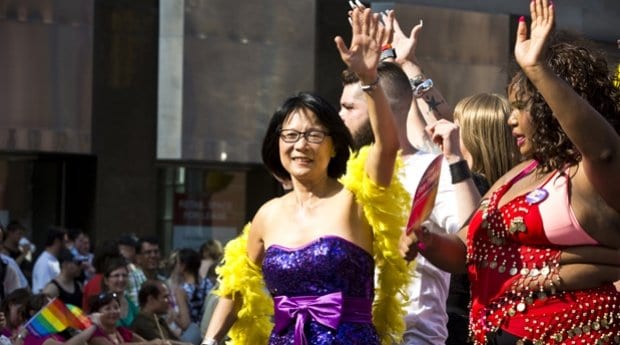This is the first of our profiles of Toronto’s leading mayoral candidates. Find our John Tory profile here. Doug Ford did not respond to our interview requests.
Toronto mayoral candidate Olivia Chow has just started her sit-down interview with Xtra when she’s interrupted — one of her aides is delivering a glass of white wine.
We’re at Church on Church, where Chow has come to help celebrate the end of ProudPolitics’ Out to Win session, just one stop on an already busy day.
But she’ll hardly touch her glass as she outlines her plans for Toronto, focusing intensely on the reporter and occasionally jabbing at her notebook — which, according to Spacing editor John Lorinc, is something of a habit for the politician.
“What I specialize in is mediating — is bringing people together so they can understand each other,” Chow says. “I have done it for so many years working in different communities.”
At the time of the interview, in early September, Chow is trailing badly in the polls after losing an early lead. “I’ve been an underdog before and I won 10 elections. We have time to get our message [out],” she says. She might be right: later in the campaign, John Tory will say in back-to-back debates that he would vote against funding Pride Toronto if Queers Against Israeli Apartheid continued to march in the parade, giving Chow a chance to affirm her support for Pride Toronto’s funding; she will be heckled with a racist comment at a debate; and a video of her responding to a xenophobic debate question will become a viral hit. At press time, the video has more than 100,000 views.
However, the most recent Forum poll has Chow polling at 25 percent — higher than in recent weeks but still trailing Doug Ford by four points and Tory by 18. She continues to push her message into the community, appearing at every debate and what seems like every community event.
Chow mentions her own connection to the LGBT community frequently. “[LGBT youth] need a mayor that will show up at Pride and has been showing up at Pride for 20 years,” she says.
She also boasts a track record on LGBT issues neither of her opponents can claim — she fought for same-sex spousal benefits for Metro Toronto employees as a city councillor, hired openly gay and trans staffers for her office and advocated for Bill C-279, the trans rights bill, while she was still an MP in Ottawa. She tells Xtra she wholeheartedly supports the creation of an LGBT sports centre and a permanent memorial for trans people.
Much like the rest of Toronto, the residents of the Village are concerned with the fast pace of development and the affordability of housing. Chow is proposing that all new condo towers include 20 percent affordable housing. But she also understands that some LGBT people face discrimination when they look for housing.
“Specifically for the trans community, some of them need supportive housing — you can partner with different agencies so the units can be set aside with support for LGBT community agencies so they are protected,” she says, citing the example of supportive housing for HIV-positive people, like Fife House.
What Chow wants to do is build those kind of bridges all across a city that many view as divided.
“That’s what I’ve done since the early ’80s in communities, and I will do it again as the mayor,” she says, before being rushed off to her next event — she has little time to waste.


 Why you can trust Xtra
Why you can trust Xtra


